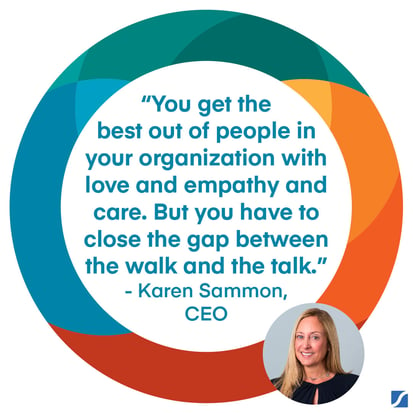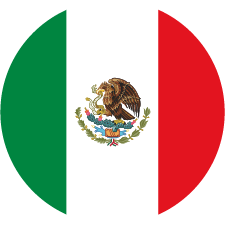How Conscious Leadership Increased PAR’s Valuation by 670%

If you are an entrepreneur, CEO, or business leader, you know how hard it is to scale your company without sacrificing your values.
Traditionally, the need for profit drives business decisions. Conscious Capitalism is a model for doing business that turns this way of thinking on its head. Profit is still a goal, but purpose is what drives the organization.
In this post, I talk with Karen Sammon, former President and CEO of PAR Technology Corp, about how she used the tenets of Conscious Capitalism to turn around and transform her company.
The 4 tenets -- higher purpose, stakeholder orientation, conscious culture, and conscious leadership -- helped Karen lead her company to $240M in revenue, and in the process make the world a better place.
That’s the power of conscious capitalism.
Focus On Purpose To Drive Results
The first tenet of conscious capitalism is higher purpose. It’s a company’s ‘why’. Profit is essential, of course. But for conscious companies, profit is a means to achieve a higher purpose rather than an end in itself.
Studies show that a ‘purpose’ orientation can have powerful results for a business.
For example, Korn Ferry found that 90% of employees at purpose-driven companies felt engaged, versus 32% at other companies. Another Korn Ferry study showed that consumer companies that focused on purpose had annual growth rates nearly three times the annual rate for their industry.

Studies show that a ‘purpose’ orientation can have powerful results for a business.
For example, Korn Ferry found that 90% of employees at purpose-driven companies felt engaged, versus 32% at other companies. Another Korn Ferry study showed that consumer companies that focused on purpose had annual growth rates nearly three times the annual rate for their industry.

Give your team a common language to communicate values
In 2010, Karen joined PAR, a leading global provider of software and hardware for restaurants. She led them through both a turnaround and a transformation.
“The company was a hardware manufacturer and a systems integrator, and we needed to bring the company forward to become a cloud-based software solution company,” she said. “And we needed the people to embrace the change that was about to happen.”
Most transformations fail, she explained.
“So we needed to bring the whole organization together. Our employees, customers, and suppliers all needed to go on this journey with us, as we went from a transactional type of revenue stream to recurring revenue. If the employees weren’t on board, it would be like an organ transplant rejection.”
For Karen, the tenets of Conscious Capitalism resonated with the way she thought about business and about stakeholders. “Conscious Capitalism gave me the language to communicate with stakeholders about what we were doing and how we were going to achieve it,” she said.
“The company was a hardware manufacturer and a systems integrator, and we needed to bring the company forward to become a cloud-based software solution company,” she said. “And we needed the people to embrace the change that was about to happen.”
Most transformations fail, she explained.
“So we needed to bring the whole organization together. Our employees, customers, and suppliers all needed to go on this journey with us, as we went from a transactional type of revenue stream to recurring revenue. If the employees weren’t on board, it would be like an organ transplant rejection.”
For Karen, the tenets of Conscious Capitalism resonated with the way she thought about business and about stakeholders. “Conscious Capitalism gave me the language to communicate with stakeholders about what we were doing and how we were going to achieve it,” she said.
A ‘Stakeholder Orientation’ Is Essential For Accountability
A ‘stakeholder orientation’ is an approach to business that focuses on creating positive outcomes for every stakeholder, rather than just maximizing profit for shareholders.
For Conscious Capitalism, these include customers, employees, suppliers, shareholders/investors, the community, and the environment. There might be other groups as well, depending on your business and which groups are key to your operations. A conscious business is committed to creating value for all of these groups.
In 2019, the Business Roundtable released a statement on the purpose of corporations, which embraced this part of the conscious capitalism philosophy wholeheartedly. In their statement they made clear commitments, including delivering value to stakeholders, investing in employees, dealing fairly and ethically with suppliers, and supporting the communities in which they work.
This is easier said than done, because there are always constraints. “But our job as leaders,” Karen said, “is to be able to find win-win situations, where shareholders understand the changes that you’re making. So everybody can see the outcome you’re working toward. Being able to create those win-win situations is critical…
“I've experienced these throughout my career. And when I hear about other organizations’ experiences, I’m energized by the opportunities that companies find between their suppliers, customers, shareholders, and employees and where they really do create that extra energy that pulls you through in difficult times.”
For Conscious Capitalism, these include customers, employees, suppliers, shareholders/investors, the community, and the environment. There might be other groups as well, depending on your business and which groups are key to your operations. A conscious business is committed to creating value for all of these groups.
In 2019, the Business Roundtable released a statement on the purpose of corporations, which embraced this part of the conscious capitalism philosophy wholeheartedly. In their statement they made clear commitments, including delivering value to stakeholders, investing in employees, dealing fairly and ethically with suppliers, and supporting the communities in which they work.
This is easier said than done, because there are always constraints. “But our job as leaders,” Karen said, “is to be able to find win-win situations, where shareholders understand the changes that you’re making. So everybody can see the outcome you’re working toward. Being able to create those win-win situations is critical…
“I've experienced these throughout my career. And when I hear about other organizations’ experiences, I’m energized by the opportunities that companies find between their suppliers, customers, shareholders, and employees and where they really do create that extra energy that pulls you through in difficult times.”
Conscious Leadership Creates Value
Conscious leaders focus on harmonizing the interests of all of their stakeholders. They recognize the role of culture and of cultivating a culture in their business. They look to be ‘servant leaders.’
Conscious leaders seek to embody the values of their company. In doing so, they display qualities like strength, energy, enthusiasm, flexibility, love and care, and a long-term orientation. They combine emotional, systems, and spiritual intelligence. That is the kind of next-level leadership that conscious capitalism brings to businesses. “It's about stewardship,” Karen explained.
Conscious leaders seek to embody the values of their company. In doing so, they display qualities like strength, energy, enthusiasm, flexibility, love and care, and a long-term orientation. They combine emotional, systems, and spiritual intelligence. That is the kind of next-level leadership that conscious capitalism brings to businesses. “It's about stewardship,” Karen explained.
“Stewardship makes us stronger. It allows us to stay focused on people and show up as the best leader that we can be. We don't just build the business; we build the people who build the business.
Conscious leaders seek out diversity. They understand that inclusion drives creativity and innovation. Conscious leaders are curious and courageous. They are leaders who listen, who have a high level of humility and awareness. Empathy is part of this as well.
We have some amazing leaders working this way. Kip Tindell from the Container Store. Dr. Kimberly Townsend of Loretto. Safwan Shah from PayActiv. These are conscious leaders, and they’ve built amazing organizations as a result.”
Conscious leaders seek out diversity. They understand that inclusion drives creativity and innovation. Conscious leaders are curious and courageous. They are leaders who listen, who have a high level of humility and awareness. Empathy is part of this as well.
We have some amazing leaders working this way. Kip Tindell from the Container Store. Dr. Kimberly Townsend of Loretto. Safwan Shah from PayActiv. These are conscious leaders, and they’ve built amazing organizations as a result.”
Conscious Culture Connects Stakeholders To The Organization’s Purpose
Conscious culture is the ethos, practices, everyday interactions, and underlying fabric of a business that permeates the atmosphere of the company. “It was the first of the 4 Conscious Capitalism tenets that I embraced,” Karen said.
In a recent Bain and Company study, 70% of business leaders agreed that culture provides the greatest source of competitive advantage for businesses.
Every company has a culture, of course. But not all companies intentionally develop their culture in a way that promotes their values and purpose and allows people to bring their full authentic selves to the table. It creates trust, accountability, caring, transparency, integrity, loyalty, and egalitarianism.
“We were taking an organization that was structured for manufacturing,” Karen said, “and bringing it forward to become a software organization. These are different kinds of jobs with different kinds of skill sets, and not everybody can make that transition.” Developing a conscious culture was essential.
In a recent Bain and Company study, 70% of business leaders agreed that culture provides the greatest source of competitive advantage for businesses.
Every company has a culture, of course. But not all companies intentionally develop their culture in a way that promotes their values and purpose and allows people to bring their full authentic selves to the table. It creates trust, accountability, caring, transparency, integrity, loyalty, and egalitarianism.
“We were taking an organization that was structured for manufacturing,” Karen said, “and bringing it forward to become a software organization. These are different kinds of jobs with different kinds of skill sets, and not everybody can make that transition.” Developing a conscious culture was essential.
A conscious culture starts with trust
Karen and her team spent significant time thinking through the impact of each move on not only the organization but also the employees’ families and communities.
“Fear is not a motivator,” she said. “You get the best out of people in your organization with love and empathy and care. I see that not only in how I built PAR, but also in other organizations in our community. Studio Movie Grill, Brian Shultz’s organization, is absolutely based on this concept of trust and love being values. But you have to close the gap between the walk and the talk.”

A conscious culture embraces diversity. A culture diverse in race and gender, as well as perspectives and viewpoints, generates great ideas.
Inspiring leaders, Karen suggests, recognize that diversity strengthens teams. We produce longer-lasting, more meaningful change when we come together in spite of perceived differences.
It's easier to talk about culture than to do the work needed to create trust and transparency, but companies that do so successfully stand to benefit.
“They create a culture of creativity,” Karen said. Instead of barriers, she explains, they see opportunity.
“Fear is not a motivator,” she said. “You get the best out of people in your organization with love and empathy and care. I see that not only in how I built PAR, but also in other organizations in our community. Studio Movie Grill, Brian Shultz’s organization, is absolutely based on this concept of trust and love being values. But you have to close the gap between the walk and the talk.”

A conscious culture embraces diversity. A culture diverse in race and gender, as well as perspectives and viewpoints, generates great ideas.
Inspiring leaders, Karen suggests, recognize that diversity strengthens teams. We produce longer-lasting, more meaningful change when we come together in spite of perceived differences.
It's easier to talk about culture than to do the work needed to create trust and transparency, but companies that do so successfully stand to benefit.
“They create a culture of creativity,” Karen said. Instead of barriers, she explains, they see opportunity.
Conclusion
Karen Sammon used 4 tenets of conscious capitalism to transform her organization from a hardware provider to a purpose-driven software company. This transformation increased PAR’s valuation $65M in 2013 to $500M in 2018.
The 4 tenets can guild your business through challenging situations as well, by offering…
The 4 tenets can guild your business through challenging situations as well, by offering…
- Leaders who are true to their passion and purpose
- Engaged, innovative employees
- Brand-loyal customers
- Positive relationships and win-win scenarios with stakeholders
- A business that is more sustainable in the long run
Of the 4 tenets of Conscious Capitalism -- higher purpose, stakeholder orientation, conscious leadership, and conscious culture -- which will you apply first?
You can listen to the recording of the entire interview with Karen Sammon here.



